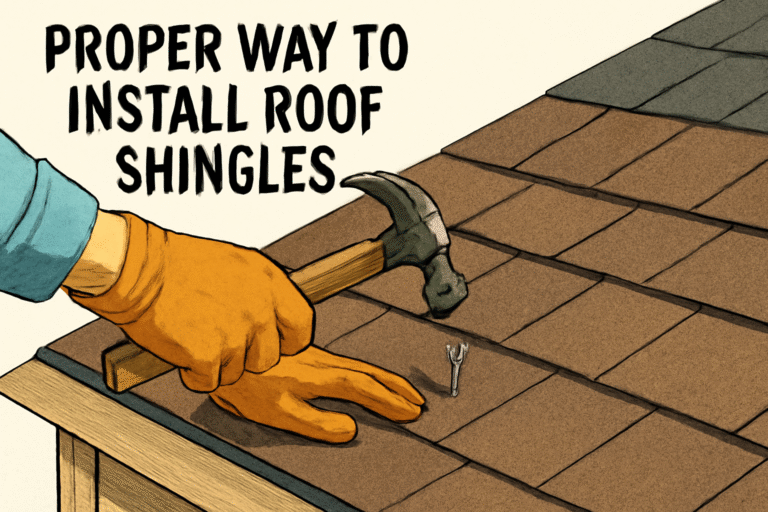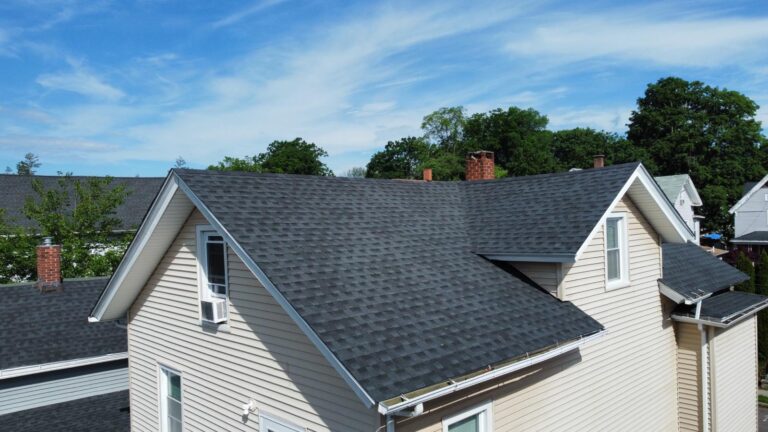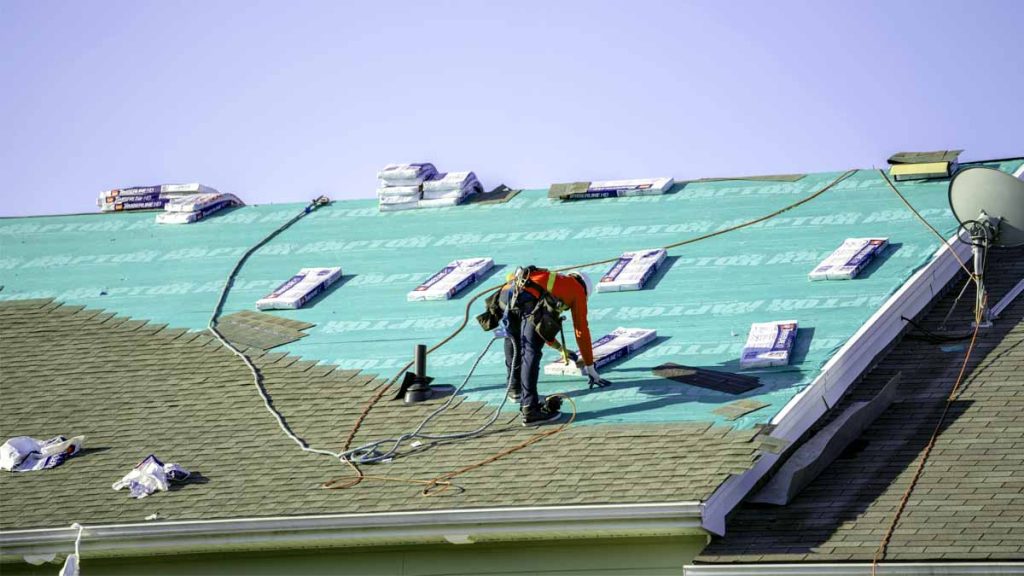
Does your Connecticut commercial property need a roof replacement or repair? Keeping a sturdy roof over your business is crucial to protecting your inventory, equipment, and employees. But with so many commercial roofing companies in Connecticut, choosing the right one can feel overwhelming. Commercial roofing is a critical aspect of building maintenance, particularly in Connecticut where the weather can be harsh and unpredictable. A well-maintained roof ensures the safety, efficiency, and longevity of a commercial building. This comprehensive guide will delve into the nuances of commercial roofing, spotlighting top companies in Connecticut, the services they offer, and how to choose the best contractor for your needs.
Overview of Commercial Roofing
Commercial roofing involves more complexity compared to residential roofing due to the scale, materials used, and the requirements of commercial buildings. Let’s explore the primary types of commercial roofing systems:
a. Flat Roofing
Flat roofs are the most common type in commercial buildings due to their cost-effectiveness and ease of installation. The main materials used include:
- EPDM (Ethylene Propylene Diene Monomer): A durable, synthetic rubber membrane that offers excellent weather resistance.
- TPO (Thermoplastic Olefin): Known for its energy efficiency and reflective properties, TPO is ideal for reducing cooling costs.
- PVC (Polyvinyl Chloride): Offers superior chemical resistance and durability, making it suitable for restaurants and facilities dealing with harsh chemicals.
b. Metal Roofing
Metal roofing systems are favored for their longevity and durability. They can withstand extreme weather conditions and are often used in industrial and warehouse settings. Common metals include:
- Aluminum: Lightweight and resistant to corrosion.
- Steel: Strong and versatile, available in various coatings to prevent rust.
- Copper: Offers a premium aesthetic and is extremely durable.
c. Built-Up Roofing (BUR)
Built-Up Roofing is composed of multiple layers of bitumen and reinforcing fabrics, creating a finished membrane. It’s known for its durability and longevity, often lasting over 20 years.
d. Modified Bitumen
Similar to BUR, modified bitumen roofing systems add polymers to the bitumen for increased flexibility and resistance to extreme temperatures. This system is often torch-applied or installed with adhesives.
Importance of Commercial Roofing Maintenance
Regular maintenance of commercial roofs is paramount for several reasons:
a. Preventing Leaks and Water Damage
Leaks can lead to extensive interior damage, including mold growth and structural deterioration. Regular inspections help detect and address minor issues before they become significant problems.
b. Extending Roof Lifespan
Routine maintenance can significantly extend the life of a commercial roof, providing better value for the investment. This includes cleaning gutters, removing debris, and repairing minor damage.
c. Ensuring Safety
A well-maintained roof prevents accidents related to structural failures, protecting employees and visitors. Safety hazards such as loose shingles or tiles can be mitigated through regular maintenance.
d. Compliance with Regulation
Regular inspections and maintenance ensure that the building complies with local building codes and regulations, avoiding potential fines and legal issues.
Key Services Offered by Commercial Roofing Companies in Connecticut

Commercial roofing companies provide a wide range of services tailored to meet the specific needs of businesses. These services include:
a. Roof Installation
- New Construction: Installation of roofing systems for new buildings, utilizing the latest materials and technologies.
- Re-Roofing: Replacing old or damaged roofs with new, more efficient systems.
b. Roof Repair
- Leak Repair: Find & fixing leaks to prevent water damage.
- Storm Damage Repair: Addressing damage caused by severe weather, including wind, hail, and heavy rain.
c. Roof Maintenance
- Regular Inspections: Conducting periodic inspections to identify potential issues before they escalate.
- Preventative Maintenance: Implementing measures to prevent common roofing problems, such as clearing debris and ensuring proper drainage.
d. Emergency Services
- 24/7 Response: Providing immediate assistance in case of emergencies, such as severe weather events or unexpected roof failures.
Top Commercial Roofing Companies in Connecticut
Connecticut boasts several reputable commercial roofing companies. Here are some of the top contenders:
a. Ace Top Roofing
- Services: Comprehensive roofing solutions including installation, repair, and maintenance.
- Specialties: Expertise in Shingle roofing and sustainable practices.
- Notable Projects: Worked on major commercial projects across Connecticut, including large office buildings and retail centers.
- Google Reviews: Ace top roofing Gain 5* Rating on Google, 1200+ Satisfied Customers.
b. Silktown Roofing
- Services: Offers a wide range of roofing services with a focus on quality and customer satisfaction.
- Specialties: Known for handling complex roofing projects and historical restorations.
- Notable Projects: Completed extensive roofing projects for educational institutions and healthcare facilities.
c. New Britain Roofing Co., Inc.
- Services: Provides tailored roofing solutions for various commercial buildings.
- Specialties: Strong reputation for reliability and professionalism.
- Notable Projects: Successfully managed roofing projects for industrial complexes and manufacturing plants.
d. United Roofing & Sheetmetal, Inc.
- Services: Full-service roofing contractor specializing in both flat and metal roofing systems.
- Specialties: Skilled in modern roofing technologies and systems.
- Notable Projects: Delivered high-quality roofing solutions for large-scale commercial properties and governmental buildings.
How to Choose a Commercial Roofing Companies in Connecticut
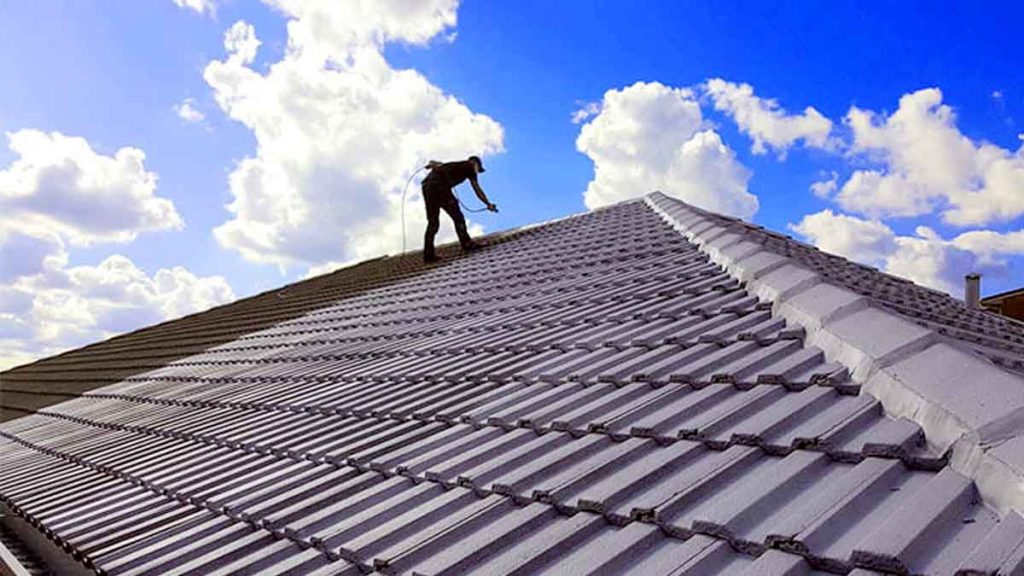
Selecting the right commercial roofing company is crucial to ensuring the success of your roofing project. Here are key factors to consider:
a. Experience and Reputation
- Track Record: Look for companies with a proven track record and positive reviews from past clients.
- Portfolio: Review their portfolio to see examples of completed projects similar to yours.
b. Licensing and Insurance
- Certification: Ensure the company is licensed to operate in Connecticut and complies with all local regulations.
- Insurance: Verify that they have adequate insurance coverage to protect against potential liabilities.
c. Range of Services
- Comprehensive Solutions: Choose a company that offers a full range of services, from installation to maintenance, ensuring they can handle all aspects of your roofing needs.
d. Pricing and Warranty
- Cost Estimates: Obtain detailed cost estimates from multiple companies and compare them to ensure you are getting fair value.
- Warranty: Check the warranty offered on both materials and workmanship to ensure long-term protection.
e. Customer Service
- Communication: Evaluate their responsiveness and communication skills to ensure they are easy to work with and keep you informed throughout the project.
- Support: Assess the level of customer support provided, including availability for emergency repairs and ongoing maintenance.
The Role of Technology in Modern Commercial Roofing
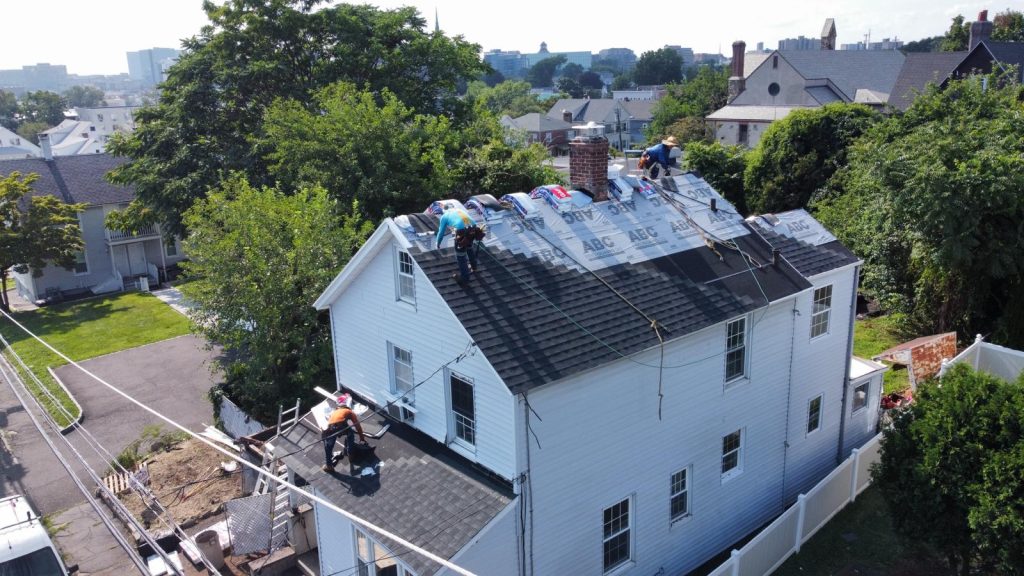
Technology has significantly advanced the roofing industry, enhancing the efficiency and quality of roofing services. Here are some of the modern technologies used in commercial roofing:
a. Drones for Inspection
- Efficiency: Drones provide quick and accurate roof inspections, capturing detailed images and videos of the roof’s condition.
- Safety: Reduces the need for manual inspections, enhancing safety for workers by minimizing the need to physically access the roof.
b. Thermal Imaging
- Leak Detection: Thermal imaging helps identify leaks and moisture issues that are not visible to the naked eye, allowing for targeted repairs.
- Energy Efficiency: Used to detect heat loss and improve insulation, thereby increasing the energy efficiency of the building.
c. Building Information Modeling (BIM)
- Project Planning: BIM facilitates detailed planning and visualization of roofing projects, helping to predict potential issues and streamline the construction process.
- Collaboration: Enhances collaboration between architects, contractors, and clients by providing a shared platform for project information.
d. Green Roofing Solutions
- Sustainability: Incorporates eco-friendly materials and designs, such as vegetative roofs and cool roofing systems, to reduce the environmental impact.
- Energy Savings: Green roofing solutions improve insulation and reduce energy consumption, contributing to lower operating costs.
Case Studies: Success Stories from Connecticut
a. Hartford Office Complex
- Challenge: The aging roof of a large office complex required replacement without disrupting business operations.
- Solution: ace top Roofing executed the project with precision, using TPO roofing materials and completing the work ahead of schedule.
- Result: The new roof improved energy efficiency and garnered positive feedback from tenants.
b. New Haven Industrial Facility
- Challenge: Severe storm damage necessitated immediate repairs to an industrial facility’s roof.
- Solution: Ace Top Roofing Service Corporation responded swiftly, utilizing advanced repair techniques and materials.
- Result: The facility resumed operations quickly, with the roof restored to its original condition.
c. Stamford Retail Center
- Challenge: A leaking roof was causing disruption and potential damage to merchandise.
- Solution: United Roofing & Sheetmetal, Inc. conducted a thorough inspection, repaired the leaks, and reinforced weak areas using high-quality materials.
- Result: The roof was fully restored, ensuring the safety of the merchandise and the continuity of business operations.
d. Bridgeport School District
- Challenge: The school district needed to replace roofs on multiple buildings within a tight budget.
- Solution: New Britain Roofing Co., Inc. provided cost-effective solutions, installing durable and energy-efficient roofing systems across the school district.
- Result: The project was completed within budget and on time, with the new roofs enhancing the schools’ energy efficiency and safety.
Environmental Impact and Sustainable Practices
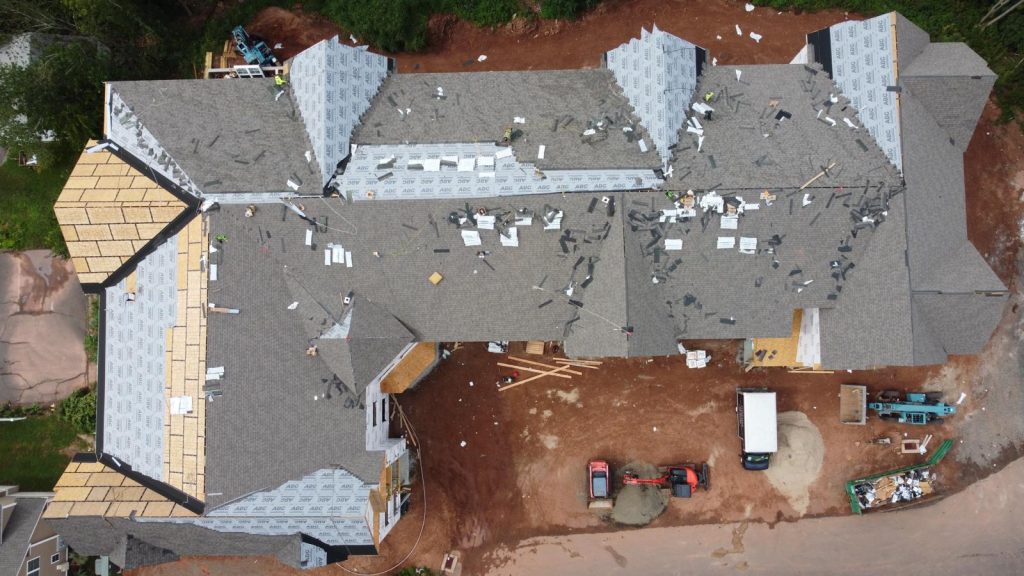
Sustainability is becoming increasingly important in the commercial roofing industry. Many companies in Connecticut are adopting green practices to reduce their environmental impact. Here are some key sustainable practices:
a. Green Roofing
- Vegetative Roofs: These roofs incorporate plant life, which helps improve insulation, reduce stormwater runoff, and provide aesthetic benefits. Green roofs also contribute to urban biodiversity and air quality improvement.
b. Energy-Efficient Materials
- Cool Roofs: These roofs use reflective materials to reduce heat absorption, thereby lowering cooling costs and mitigating the urban heat island effect. Cool roofs are particularly beneficial in reducing energy consumption in large commercial buildings.
c. Recycling Programs
- Material Reuse: Companies are increasingly recycling old roofing materials, such as asphalt shingles and metal, to minimize waste. Recycling programs help divert materials from landfills and reduce the demand for new raw materials.
d. Solar Roofing
- Photovoltaic Systems: Integrating solar panels into roofing systems to harness solar energy, reducing reliance on traditional energy sources, and lowering energy bills. Solar roofing is an excellent way to make commercial buildings more sustainable and energy-independent.
Frequently Asked Questions about Commercial Roofing
Q1: How often should a commercial roof be inspected?
- Answer: It is recommended to inspect a commercial roof at least twice a year, preferably in the spring and fall. Additional inspections should be conducted after major weather events.
Q2: What are the signs of a failing commercial roof?
- Answer: Common signs include leaks, water stains on ceilings, sagging areas, visible damage to the roofing materials, and an increase in energy bills due to poor insulation.
Q3: Can a commercial roof be repaired instead of replaced?
- Answer: Depending on the extent of the damage, many issues can be repaired. However, if the roof is significantly deteriorated or has reached the end of its expected lifespan, replacement might be necessary.
Q4: What are the benefits of a maintenance contract?
- Answer: Maintenance contracts provide regular inspections and preventative maintenance, which can extend the lifespan of the roof, reduce the likelihood of unexpected repairs, and save money in the long run. They also ensure compliance with warranty requirements and local regulations.
Q5: How do I choose the right material for my commercial building?
- Answer: The choice depends on factors like the type of building, local climate, budget, and specific needs. Consulting with a professional roofing company can help determine the best option, taking into account durability, energy efficiency, and aesthetic considerations.
Conclusion
Choosing the right commercial roofing company in Connecticut is essential for ensuring the longevity and safety of your building’s roof. By understanding the types of services offered, the importance of regular maintenance, and the factors to consider when selecting a roofing company, you can make an informed decision that meets your specific needs.
Investing in professional commercial roofing services not only protects your property but also enhances its value and functionality. Whether you’re looking to install a new roof, repair an existing one, or implement sustainable practices, the commercial roofing companies in Connecticut are equipped to deliver exceptional results.


